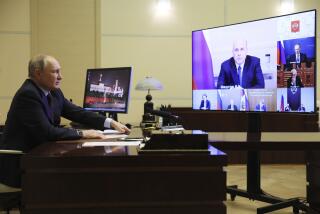France Ends Nuclear Tests, to Press for Ban
- Share via
PARIS — After completing six of eight planned nuclear-weapon tests in the South Pacific, French President Jacques Chirac announced Monday night a “definitive end” to the detonations, and he raced to mend fences with other nations by vowing to lead the drive to ban such tests worldwide.
With high drama, Chirac made the announcement in a nationally televised address from the Elysee presidential palace, saying that, thanks to the success of the latest series of tests, “France will have at its disposal a viable and modern defense. The security of our country and our children is assured.”
The decision followed the sixth, and largest, atomic blast Saturday and came two days before Chirac is due to visit the United States, one of many countries in which his decision in June to resume nuclear tests was criticized.
Seeking to put the diplomatic damage of the tests behind him, Chirac declared that “a new chapter is opening. France will play an active and determined role for disarmament in the world and for a better European defense.”
In Washington, the White House welcomed Chirac’s decision.
“The United States has consistently urged that all nations abide by a global moratorium on nuclear testing as we work to complete and sign a Comprehensive Test Ban Treaty [CTBT],” said Mike McCurry, the White House press secretary. McCurry added that the decision in Paris “will provide new momentum to our efforts to conclude a CTBT that can be signed this fall.”
After months of defying the world with his nuclear detonations, Chirac on Monday had suddenly transformed himself into a leading opponent of such tests. In a communique issued by his office, Chirac said France would “spare no effort” to persuade other countries to join it in signing the treaty “to prohibit definitively all nuclear tests.”
That promise illustrates, he added, “the willingness of France to be in the first row of efforts in the international community against the proliferation of arms of mass destruction.”
Penelope Komites, executive director of the French office of the environmental group Greenpeace, said the end of the French campaign could, if it leads to total nuclear disarmament, “be perceived in 10 or 20 years as a major event, even an historic event, at the end of the 20th century.”
The last and most powerful test, at the Fangataufa atoll on Saturday, was equivalent to about 120,000 tons of conventional explosives, about six times as powerful as the atomic bomb dropped on Hiroshima in 1945.
Some scientists contend that fracturing of the coral reef at the nearby Mururoa atoll, where several other tests were conducted, is more extensive than the French government has admitted. France has allowed only limited investigation of the test sites by outside experts.
Charles Millon, the French defense minister, said Monday that all six tests had been “particularly successful scientifically” and that scientists will be ready to begin simulating nuclear blasts in a laboratory within months.
Pressure on the French government began soon after Chirac’s decision in June to end the country’s nuclear moratorium and conduct eight tests from September 1995 to May of this year. Over the years, France had conducted 204 nuclear tests, mostly in the South Pacific.
The decision spawned numerous diplomatic rebukes, particularly from Japan and Australia, and boycotts of French products. Opinion polls in France showed a large majority of citizens opposed to the tests. Although the French government played down long-term damage to its relationships with Asia-Pacific countries, it was clearly worried about threats to its $17 billion in annual exports to that region.
Chirac refused to back down, arguing that the nuclear arsenal needed to be modernized before France could sign a nuclear test ban treaty. But he modified his original plan, saying that six successful tests would be sufficient.
“I’m not insensitive to public opinion,” he said Monday, adding that the desire to protect the environment “is one of my preoccupations as well.” But, he said, a nuclear arsenal is “for us, a weapon of deterrence, a weapon in the service of peace.”
And Chirac called the tests one of the most important accomplishments of his 8 1/2-month-old presidency.
More to Read
Sign up for Essential California
The most important California stories and recommendations in your inbox every morning.
You may occasionally receive promotional content from the Los Angeles Times.











